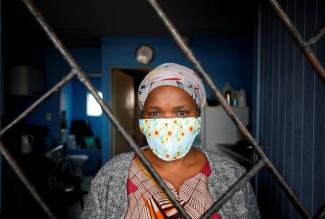Debt problems
World Bank sounds alarm as debt problems worsen
 picture alliance / Mike Hutchings
picture alliance / Mike Hutchings
The flagship report warns of persistent and severe economic impacts of Covid-19, which will particularly affect emerging economies. Improving the health of the financial sector is said to be quintessential for an equitable global recovery.
The pandemic devastated the world economy. The crisis unfolded with millions of deaths, job losses, business failures and school closures. The Covid-19 disruption exposed and aggravated existing fragilities, unravelling the social fabric in many countries.
The “once-in-a-century” crisis led to the largest single-year surge in global debt in recent decades. In 2020, the World Bank reckons, the average total debt burden of low- and middle-income countries increased by about nine percent of GDP. Over the previous decade, the annual increase had been only 1.9 %.
The report highlights the connected nature of the financial health of households and firms, financial institutions and governments. It spells out that growing financial risk in one sector can destabilise an entire economy.
Households and firms
World Bank data shows that, in 2020, more than half of the world’s households were unable to sustain basic consumption for more than three months after substantial income losses. Moreover, the cash reserves of an average business would not even cover 51 days of expenses necessary to remain solvent.
Disadvantaged groups were disproportionately affected. Their financial resilience was limited to begin with, and workers with lower levels of education were typically unable to work from home. Those who suffered worse initial losses, moreover, tended to recover more slowly than the better off.
Young people and women were hit the hardest. The World Bank reckons that by July 2020, 42 % of women had lost their jobs. The comparative share for men was 31%. The report points out that women were more likely to be employed in sectors most affected by lockdowns and social-distancing rules. Moreover, they bore the brunt of increased care work, not only looking after the sick, but also after children who no longer went to school.
In a similar way, informal businesses and small firms struggled in particular. The authors reckon that the informal sector accounts for more than one third of GDP in Latin America and sub-Saharan Africa and more than one quarter in South Asia. Given the fact that it employs a much larger share of the workforce in the regions concerned, it is of great economic relevance. These businesses generally lack access to formal financial services, and that is even true of many small firms which are formally registered.
Government action
What action a national government could take in response to Covid-19 obviously depends on the health of its banking system and its public finances. In other words, the macroeconomic situation before the pandemic mattered very much.
A broad range of policy measures proved useful for mitigating pandemic impacts. They included cash transfers to households, credit guarantees for firms, government subsidies and repayment grace periods. Relaxing some financial-sector rules was helpful too. Since not all nations could afford them to the same extent, disparities between countries increased significantly, the World Bank insists.
While policy measures helped to mitigate some socio-economic consequences of the pandemic, they also elevated longer-term risks regarding over-indebtedness, financial fragility and public transparency. To fund current spending, governments had to accumulate additional debt, which in turn reduces their future spending capacities. The report warns that impacts will affect social services, including education and health care.
Adding to the problems, the central banks of high-income countries are worried about rising inflation and starting to raise interest rates. Since the global financial crisis, their interest rates have been abnormally low. Rising interest rates, however, will make it more expensive to service sovereign debt. Accordingly, the budgets of heavily indebted countries will be put under even more stress.
Debt distress means that a debtor is unable to fulfil financial obligations. The World Bank experts report that debt distress is growing internationally, as 51 countries, including 44 emerging economies, experienced a downgrade in their sovereign debt credit rating during the course of the pandemic.
The World Bank appreciates that the group of 20 largest economies (G20), launched the Debt Service Suspension Initiative (DSSI) in response to the pandemic in 2020. Low-income countries’ payment obligations have thus been suspended temporarily. The authors warn, however, that more needs to be done. They point out that half of the countries eligible were in or close to debt distress before the pandemic began. The situation has just worsened over its course. Moreover, other countries, which do not belong to the low-income group, are also facing debt distress (see Kathrin Berensmann on www.dandc.eu).
The World Bank experts more generally warn that new challenges will arise – both at national and international levels – as fiscal, monetary and financial stimulus programmes are withdrawn. They add that risks may be hidden, given that the balance sheets of households, firms, financial sector institutions and governments are closely interrelated.
Policy recommendations
The World Development Report identifies the need to detect significant financial risks early on. Moreover, debt distress must be eased in all sectors, from national budgets to microfinance institutions. The authors emphasise that economic recovery will often hinge on the restructuring of loans in ways that make them manageable. Finally, they want the global community to do more to give more people and companies access to financial services.
To prevent global turbulences, the World Bank advises advanced economies to unwind extraordinary stimulus policies carefully. Moreover, they should pay attention to the specific needs of small and mid-sized enterprises, which are the backbone of global supply chains. The message for emerging economies is that they should reduce their excessive financial dependency on developed nations. They should therefore build buffers, but not compromise the accumulation of human and physical capital.
The World Development Report was published before Russia invaded Ukraine, and thus does not consider possible impacts. While it does not delve deeply into climate issues, it appreciates green and social bonds issued by Nigeria and Chile. More generally speaking, it acknowledges that governments’ ability to invest in green economies will be critical to counteract the inequitable impacts of the climate crisis, but does not propose an agenda. All summed up, the global financial scenario is thus even more difficult than what the report spells out.
As Achim Steiner, the administrator of the UN Development Programme has said, there is a global need “to build forward better” (see Achim Steiner on www.dandc.eu). That has become even harder since.
Link
World Bank, 2022: Finance for an equitable recovery. World Development Report 2022.
https://www.worldbank.org/en/publication/wdr2022
Roli Mahajan is an Indian freelance journalist who lives in Lucknow.
roli.mahajan@gmail.com
